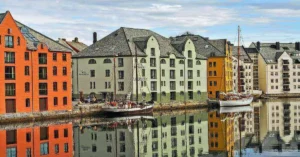Norway is a beautiful country with a population of approximately 5.5 million, boasting a low unemployment rate and an excellent welfare system. Its educational system is also one of the best in the world, making it an ideal place to raise children. Family comes first in Norway, with flexible working hours, outdoor activities, and even a recycling system that pays you to participate in their daily life.
Norwegians enjoy a variety of guarantees, such as unemployment benefits, maternity/paternity leave, and child benefits of 970 crowns per month (Barnetryg).
But it’s not all northern lights, mooses and rainbows if you don’t have a qualified job or don’t know the language, as Norway can be expensive. During the long and dark winters, it’s important to socialize and make life more bearable. The typical “Kos” of Norwegians is all about enjoying small moments, making it a comfortable and cozy place to be.
Here are some things to keep in mind:
- First things first: When you arrive, if you’re an EU citizen, you won’t need a visa, and you can easily move around with your ID card. However, if you plan to stay longer than three months, you must register with the UDI (Directorate of Immigration). If you intend to work, you must also register with the SUA (Foreign Labor Center) and apply for a tax card (Skattekort) to pay taxes. You’ll need a work contract and to complete the RF-1209 form.
- The unemployment rate in Norway is 3.6%, and the average salary for an unskilled job is around €2,400, while a skilled job, where you’ll need to know the language, can earn you around €4,700. Even in international companies that accept applications in English, knowing the language is essential to increase your chances of success and participate in internal conversations. The importance of socializing in Norway cannot be overstated.
- If you opt for an unskilled job, such as cleaning or waiting tables, and you don’t know the language, include a cover letter in Norwegian with your CV. Norwegians appreciate this and value it highly, which may give you a better chance of getting hired.
- Job portals to consider include Nav, Tecnojobb, Careerjet, and Jobb Norge, while placement agencies include Jobzone, Adecco, Randstad, and Toptemp.
- Open a bank account in Norwegian kroner and get a Norwegian mobile phone. If you don’t want to pay commission fees when making payments with your foreign card or withdrawing money, Wise is a great option. It allows you to have money in over 40 different currencies and offers the average market exchange rate with a small commission fee. The account is free, with no maintenance costs, and comes with a Mastercard.
- For your phone, you can use your SIM card without any problems as Norway has European roaming. However, it’s unlikely that a potential employer will call a foreign number, which is something to keep in mind. A 6-gig prepaid plan costs around €28, and the main companies are Telenor, NetCom, and Telia.
- The healthcare system is excellent and operates on a co-payment basis for the general population. To register, go to Helsenorge, and the government will assign a healthcare professional to you. However, once assigned, you cannot change, and most professionals only speak Norwegian. Children under 18 also have access to free dental care.
- The working conditions are excellent, with Monday to Friday work hours from 8 a.m. to 4 p.m. Overtime is generally discouraged in favor of family time and
Norway is a country that offers many benefits to its residents. Summer holidays are mandatory, and if you have children under your care and one of them falls ill, you can take time off work without needing a doctor’s note. Norway has one of the world’s best education systems, with teaching, textbooks, and school supplies provided free of charge. However, the cost of living is higher than the rest of Europe, in line with Norwegian salaries. It is therefore important to secure a qualified job to enjoy all of these privileges.
To give you an idea of the costs, a coffee with milk costs about 4 euros, a dozen eggs 5 euros, and a set menu costs 21 euros. Therefore, cooking at home is as expensive as eating out. In terms of transportation, there is one company that manages buses, subways, and trains. You can purchase a 24-hour unlimited travel ticket for 10 euros or a monthly pass for 82 euros. That’s why choosing where to live is so important. While Oslo, the capital, offers more job opportunities, Alesud has a moderate cost of living and all necessary services.
The cost of independent studio apartments can range from 1200 euros per month, but if your budget is tight, you can share a flat for half the price, around 600 euros. It’s also essential to learn some Norwegian vocabulary to understand rental ads. For example, “Boliger til leie” means “property for rent,” “Hybel” means “studio,” and “Kollektiv” means “shared apartment,” while “Full moblert” means “furnished.”
If you’re considering moving to Norway, in my next article, I’ll discuss the country’s main cities, their pros and cons, and how to find a job. I’ll also cover renting an apartment, security deposits, and anything else you’re curious about based on my years of living in Norway.







